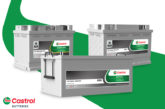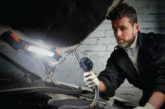When it comes to fire safety, pre-emptive action is a necessity. Repairing a business after watching it burn to the ground is a mammoth task, so having an established fire safety plan is a real, and literal, life-saver. PMM finds out more.
Your workshop is likely to be full of potential hazards, from flammable liquids to high-tech equipment. However, with the right precautions, the risk can be reduced significantly to keep your staff, customers, and business safe.
70% of businesses that are affected by a major fire either do not reopen or subsequently fail within three years. It is far easier to take action now, rather than trying to recover from a fire. That is why the Regulatory Reform (Fire Safety) Order 2005 exists, and why failure to comply comes with a large fine and a possible prison sentence for the owner.
Luckily, it is not actually as hard to comply as you might imagine…
The fire risk assessment
Completed by the workshop owner, a competent person, or a professional risk assessor, the fire risk assessment will ensure all the hazards are identified and countered. Although it’s only a requirement to have a written record when you hire five or more people, doing so provides you with proof that you’re fulfilling your duties.
A fire risk assessment has five stages:
1. Identify all potential combustibles and possible sources of ignition.
2. Consider all the relevant people who are at greatest risk from a fire.
3. Remove or reduce the risks of fire as much as possible, and provide precautions.
4. Prepare for an emergency with fire safety equipment, by providing correct training, and by having a plan of which everyone is aware.
5. Record any findings and regularly review the assessment to keep it up-to-date.
Your findings at each stage will vary as every workshop is different, but there are some common things to consider.
Spotting fire hazards
Petrol, diesel, oil, solvents, paints and pressurised cylinders are all potential fuel sources of a deadly fire, plus many more. Any flammable liquids stored need to be in flammable storage tanks which not only protect them from fire but also keep them in the optimum condition.
Likewise, any waste also needs to be stored appropriately until it can be disposed of responsibly.
It is also necessary to lock pressurised cylinders, such as those used for welding, in fireproof containers, and they should only be used by properly trained individuals. Essentially, they need to be kept well away from possible sources of ignition, whether that be a stray spark, lighters or the heating turned up full whack in the winter.
But don’t forget the electrical equipment in your workshop. By having it properly serviced and maintained, you ensure it remains in good condition and any faults are found before they cause any problems.
Choosing the right extinguishers
It is vital that the right extinguisher is used on a fire. This is why you should train mechanics and other staff on extinguisher/fire type and provide correct signage.
Within a workshop, a multi-purpose powder extinguisher is probably the ideal choice as it is safe to use on fires involving things like paper, rubbish and cloth, as well as flammable liquids and gases. It’s also safe if sprayed inadvertently on something electrical. However, in a confined space it can severely reduce visibility and affect breathing. When it is specified for use indoors, the British Standards recommend mitigating it with a health and safety risk assessment.
For use on your extensive electrical equipment, a CO2 extinguisher is the best choice as it smothers the flames without leaving a residue. Not only do you need to consider the contents of the extinguisher, but also the size, and don’t forget that extinguishers must be serviced annually to ensure you can rely on them when needed.
Plan and prepare
Like everything in life, it’s best to have a plan of action before an emergency occurs. Everyone in the business then needs to know the details. It should cover everything from who dials 999 to where the assembly point is. You can then put the plan to the test with a fire drill.
You also need a few staff members trained as fire wardens, so that they can act and provide support in a fire and assist you in promoting good fire safety.










